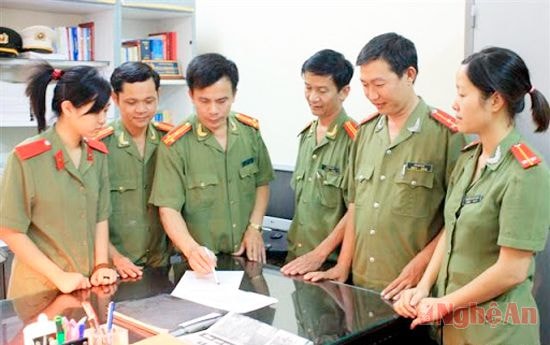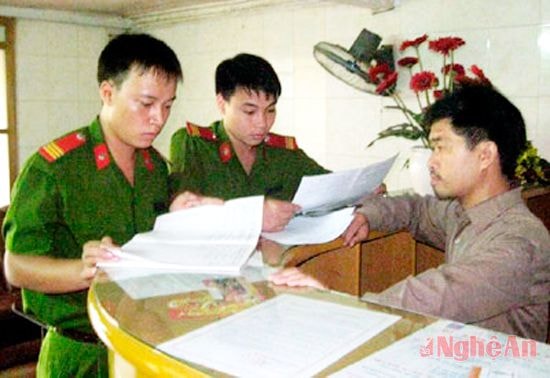No criminals "get away" thanks to temporary residence checks
(Baonghean) - The work of checking temporary residence and temporary absence is a job that seems to be "hidden" behind the myriad of tasks of the authorities. But in reality, this is not just a simple administrative measure, but from these "administrative checks" that many people (especially owners of inns, hotels, motels) consider to be troublesome, many crooks and criminals have been discovered...
Breaking the spy case from small details on the ID card
When hearing the owner of a motel in Vinh City complain about the ward police being strict about temporary residence procedures, Mr. Nguyen Van Do, currently residing in Ben Thuy Ward, a former counterintelligence agent of Nghe An Police during the resistance war against the US, said that such perception was wrong and recounted a story related to identity checks:
One day in late May 1962, two police officers from the Ben Thuy area, Sergeant Do Ngoc Huyen and Corporal Nguyen Van Tan, while checking the temporary residence registration at the inn, discovered a suspected case of a thief. It was a man about 35 years old, who had arrived at the inn since early evening. According to the "Passport" issued by the Vinh Linh Police Department on March 19, 1962, which he reported, the name Tran Ngoc Tam was from Quynh Luu, working as a forestry worker in Vinh Linh. What the two police officers paid the most attention to was the "Passport" that Tam was using. The fact that the title on the paper was "Inter-Zone IV Police - Vinh Linh Area Police" alone was unreasonable. The paper was dated March 19, 1962, but in fact, Inter-Zone IV Police had been dissolved since 1959.
 |
| Vinh City Police leaders assigned the task of checking temporary residence for officers and soldiers. |
The suspicions of the two local policemen were reported to the Vinh City Police Command and the Nghe An Police Department's Political Protection Department. Immediately after, all of this man's movements were under the control of counterintelligence reconnaissance soldiers.
Early the next morning, with the ticket bought the previous afternoon, the man bought a ticket and got on the “Vinh - Dong Hoi” bus. A few minutes later, the reconnaissance team led by Mr. Nguyen Van Do, posing as tour operators, also got on the bus to follow the suspicious subject.
Before the bus left the station, team leader Do received an order from the unit commander to coordinate with the Quang Binh Police to immediately arrest the suspect in Dong Hoi town, because there was a high possibility that after getting off at Dong Hoi bus station, the suspect would find a way to go to Vinh Linh and then cross the line to the South. The commander's order was carried out by the reconnaissance team in coordination with the Quang Binh Police force as soon as the bus stopped at the station.
At the police station, after a long time of denying, he finally confessed that his real name was Nguyen Chau Thanh, from Quynh Luu, who had fled to the South to join the enemy in 1954. In the South, he was selected by the US-puppet intelligence agency and trained as a shuttle spy. In March 1962, according to the plan of the Central Intelligence Office of Saigon, Nguyen Chau Thanh crossed the Ben Hai River (Vinh Linh) to the North with a fake passport.
After returning home safely, Nguyen Chau Thanh secretly stayed at a relative's house in Quynh Thuan commune and in just over 3 months, he found a way to meet some bad elements in Quynh Luu, Dien Chau, Nghi Loc to connect and create a network of bases to help him grasp the situation in preparation for the "Northward advance" plan. After the initial results, Nguyen Chau Thanh found a way to go to the South to report the situation and ask for instructions...
Realizing that this was an important espionage case, a special task force was established under the direct command of comrade Tran Thieu, Deputy Chief of the Public Security Department, and comrade Ho Sy Truong, Head of the Political Protection Department. Professional measures and mass mobilization work to "protect against espionage" were strongly launched in key areas. And in a short time, a network of 42 individuals built by Nguyen Chau Thanh during his time operating in Quynh Luu, Dien Chau was exposed. Dangerous names in this spy network such as Tran Dinh Can (disguised as a priest), Vu Thi Que, Vu Sy Tung, Ho Duc Hoan, Tran Vy, etc. all confessed that they were preparing to build a "secret base" and planning to cause riots so that when the enemy "advances to the North", they will "rise up".
It is worth mentioning that, long after that, Nguyen Chau Thanh still did not understand why he was exposed on that return...
Arrested fugitive from temporary residence check in village...
A few years ago, Nghia Binh Commune Police in Tan Ky District received information from local residents that there was a middle-aged man with a suspicious Northern accent at Mr. Nguyen Hai's house. According to the homeowner, he was an acquaintance from Bac Giang Province who had some sad news and came in to distract himself. However, according to the neighbors, this man rarely went out, and when he did, his eyes were always furtive and his demeanor was unnatural. Some people told Mr. Hai to take guests and papers to the neighborhood police station to register for temporary residence, but he brushed it off: "Making up stories! They are all acquaintances!..."
 |
| Vinh City police check temporary residence at a motel. |
One evening, Mr. Tran Van Son - Chief of the Commune Police led a police team to check the temporary residence at Mr. Nguyen Hai's house. Mr. Hai and his wife reported to the commune police: there was an acquaintance from Bac Giang who had been visiting for a few days... They knew each other and understood each other, so he did not report it. Then, he called the guest named Binh to present himself. With a natural expression and a proper greeting, Binh said that he had forgotten his papers in his hometown. "Because of some sad events, I became absent-minded" - Binh said while scratching his ear.
Unfortunately for the criminal, while listening to the guest's explanation, the commune police chief remembered the "special wanted" warrant that the district police had sent down a few days ago. It seemed that there were some similarities between the wanted subject and the guest. They were both named Binh (he forgot the subject's last name) and both resided in Bac Giang province (he forgot the district and commune). It seemed that this guy was... him. The commune police officer's intuition told him so. Thinking so, Mr. Tran Van Son invited the young man to the commune headquarters to clarify.
Knowing that it would be difficult to deny, Mr. Hai's guest confessed that his name was Nguyen Duc Binh, born in 1958, currently residing in Tran Phu ward, Bac Giang city, Bac Giang province. He was the one who stabbed someone to death at a bar because of some previous conflicts. After committing the crime, he went to Hanoi to hide for 3 days, then found his way to Tan Ky pretending to visit an acquaintance to avoid the law.
From the above two incidents, we can see that the work of checking identity cards and identity cards is extremely important. However, currently, many local officials, especially those in rural areas, remote areas, often let it slide, taking advantage of this loophole, many criminals have taken advantage of it to commit illegal acts. The above incident is also a valuable lesson for local authorities in the work of managing people, especially strangers from other places.
Regarding the violation of temporary residence registration, it is stipulated in Article 11 of Decree 73/2010/ND-CP of the Government dated July 12, 2010 on administrative sanctions in the field of security and order as follows (excerpt): 1. A fine of VND 100,000 to VND 200,000 shall be imposed for one of the following acts: - Failure to comply with regulations on permanent and temporary residence registration; 2. A fine of from VND 1,000,000 to VND 2,000,000 shall be imposed for one of the following acts: - Failure to notify the police of the stay as prescribed when someone comes to stay; - Inciting, instigating, enticing, luring, brokering, or forcing others to violate the law on residence. |
Viet Long
